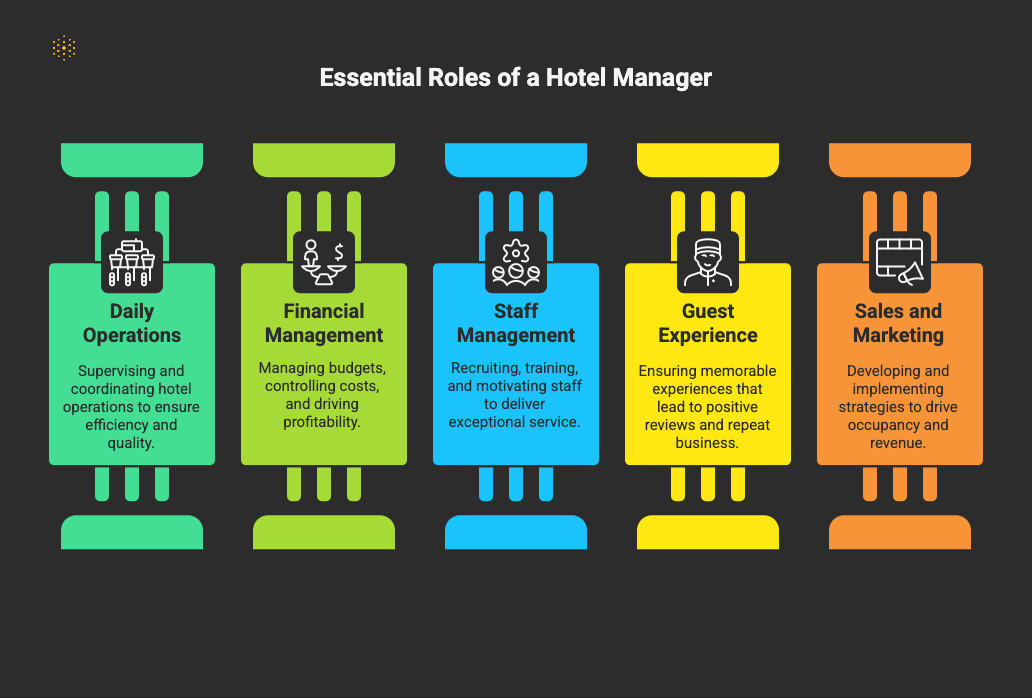Managing a hotel is far more than just keeping rooms booked and guests happy, it’s a high-stakes balancing act that blends business acumen, leadership, and impeccable attention to detail.
With the industry creating around 6,000 new hotel management jobs every year, demand for skilled professionals is on a steady rise.
From overseeing daily operations and managing budgets to inspiring teams and ensuring every guest feels like royalty, a hotel manager wears many hats.
In this guide, we’ll break down the core responsibilities, essential skills, and career outlook for aspiring and seasoned professionals alike, so you know exactly what it takes to excel in this fast-paced, rewarding role.
1. Overseeing Daily Operations
The primary duty of a hotel manager is to supervise the day-to-day operations of the property. This is the core of the role, requiring a keen eye for detail to ensure everything runs like a well-oiled machine.
You'll be the go-to person for coordinating various departments to maintain quality and efficiency. Your responsibilities in this area include:
- Coordinating Departments: Ensuring the front desk, housekeeping, food and beverage, and maintenance teams work together seamlessly.
- Maintaining Standards: Implementing and upholding operational procedures to meet the hotel's quality standards.
- Troubleshooting: Addressing and resolving problems as they arise, from a guest complaint to a maintenance issue.
- Property Inspections: Regularly carrying out inspections of the property and services to ensure everything is up to par.
This aspect of the job is similar to that of an operations manager, requiring strong logistical and organizational skills.
2. Financial Management
A hotel is a business, and the manager is commercially accountable for its financial performance. You'll be responsible for managing budgets, controlling expenditure, and driving profitability.
Key financial duties involve:
- Budgeting and Forecasting: Developing and managing the hotel's budget and forecasting revenue.
- Controlling Costs: Implementing strategies to control costs and improve profitability.
- Financial Reporting: Maintaining and analyzing statistical and financial records to track performance.
- Revenue Management: Analyzing sales figures and devising market and revenue management strategies to achieve sales and profit targets.
Also Read: How to bag customer service jobs?
3. Staff Management and Leadership
A great hotel manager is also a great leader. You'll be in charge of recruiting, training, and motivating your team to deliver exceptional service.
Your ability to build a positive and productive work environment is crucial. Leadership responsibilities include:
- Recruiting and Training: Hiring the right people and ensuring they receive the proper training to succeed in their roles.
- Team Building: Fostering a collaborative environment where staff feel valued and motivated.
- Scheduling and Monitoring: Planning work schedules for individuals and teams and monitoring their performance.
- Conflict Resolution: Acting as a mediator to resolve any conflicts that may arise among staff members.

4. Ensuring an Exceptional Guest Experience
In the hospitality industry, the guest is king. A hotel manager must champion excellent customer service to create memorable experiences that lead to positive reviews and repeat business.
This involves:
- Meeting and Greeting Guests: Being a visible presence in the hotel and interacting with customers.
- Handling Complaints: Dealing with customer complaints and comments promptly and professionally.
- Anticipating Needs: Going above and beyond to anticipate guest needs and exceed their expectations.
Strong customer service skills are non-negotiable!
5. Sales and Marketing
You'll also play a key role in promoting and marketing the business. To keep rooms filled, a hotel manager must develop and implement effective sales and marketing strategies.
Your tasks will include:
- Developing Strategies: Working with the sales team to create strategies that drive occupancy and revenue.
- Market Analysis: Monitoring market trends and conducting competitor analysis to stay ahead.
- Promoting the Business: Actively promoting the hotel's services and amenities to attract new customers.

6. Essential Skills and Qualifications
While studying hospitality or business at places like SHMS Hospitality School can give you an edge, hotel-industry employers ultimately place a massive emphasis on real experience.
To succeed as a hotel manager, you need a balanced mix of soft skills to handle the people-side of the business and technical skills to manage the operational side.
- Property Management Systems (PMS): Proficiency in PMS software is non-negotiable. This is the digital backbone of the hotel, handling reservations, check-ins, room assignments, and billing. Popular systems you should know include Oracle Hospitality (OPERA), Mews, and Cloudbeds.
- Point-of-Sale (POS) Systems: If the hotel has restaurants, bars, or retail shops, you'll need to be familiar with POS systems like Toast or Square to manage orders and payments.
- Revenue Management Software: Knowledge of tools that help analyze data to predict demand and optimize room pricing is a major asset.
- Customer Relationship Management (CRM) Software: CRM systems help manage guest data, track interactions, and personalize the guest experience.
- Inventory Management Systems: These are crucial for tracking and ordering supplies for housekeeping, food and beverage, and other departments.
- Basic Accounting & Financial Software: A strong understanding of financial statements and proficiency with accounting software is necessary for budgeting, payroll, and financial reporting.
- Online Travel Agency (OTA) & Channel Management: You'll need to know how to work with platforms like Expedia and Booking.com and use channel management tools to update availability and rates across all booking platforms simultaneously.
7. Salary and Career Outlook in the U.S.
The hospitality industry in the United States is a dynamic field with a promising future.
According to the U.S. Bureau of Labor Statistics, employment of lodging managers is projected to grow 10% from 2023 to 2033, which is much faster than the average for all occupations.
This surge in demand means greater opportunities and job security for skilled professionals entering the field.
A hotel manager's salary in the U.S. can vary significantly based on your experience, the hotel's size and location, and its brand.
- Average Salary: As of 2025, the average annual salary for a hotel manager in the United States is around $64,000 to $78,000.
- Entry-Level: If you're just starting, you can expect a salary in the ballpark of $38,000 to $47,000. Many begin as an assistant hotel manager, which has an average salary of about $46,000.
- Top Earners: With experience and a proven track record, especially at a large, luxury, or high-demand property, you can earn well into the six figures, with top salaries exceeding $127,000.
With faster-than-average job growth and millions employed in the industry, the opportunities for career advancement in hotel management are better than ever.
Also Read: How to make a job winning manager resume?
Ready to Start Your Journey?
The role of a hotel manager is multifaceted and demanding, but for the right person, it offers an exciting and fulfilling career.
By understanding these key areas of the job description, you can better prepare yourself to not just land a job, but to excel in it.
And if you want to stand out in a competitive hospitality market, Hiration can help you get there.
From refining your resume and cover letters to preparing you for high-stakes interviews, and polishing your LinkedIn profile, we make sure your experience and potential are impossible to overlook.
Combine that with the knowledge you’ve gained here, and you’ll be ready to step into your next hotel management role with confidence.



